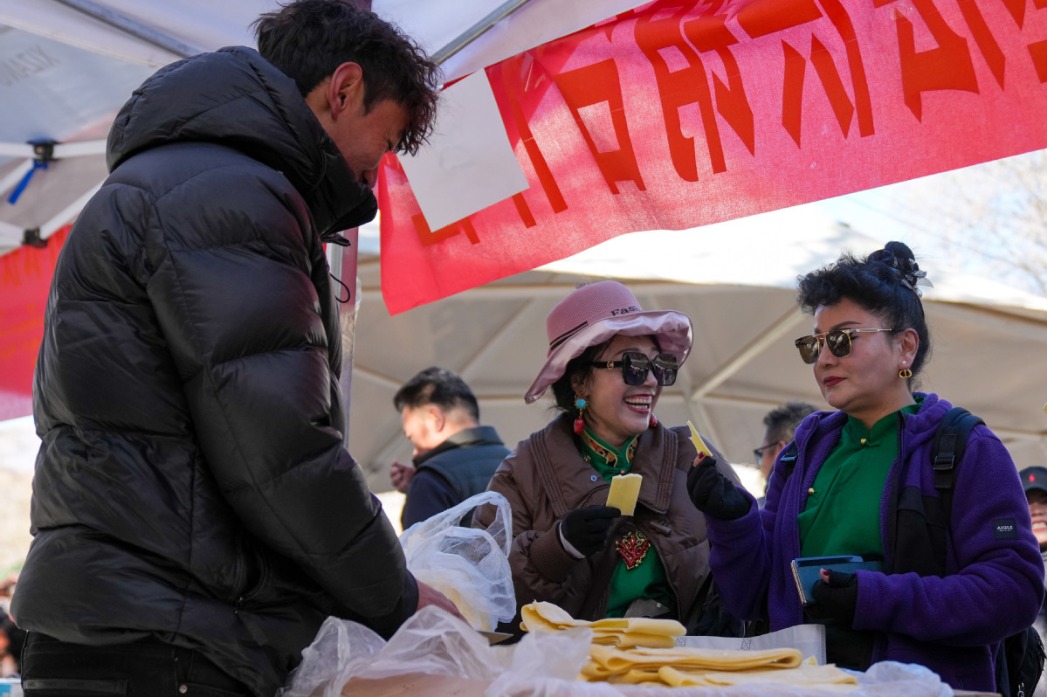Reform brings rural community new life






Editor's note: Tuesday marked the 35th anniversary of the founding of a rural reform pilot zone in the environmentally fragile city of Bijie, Guizhou province. China Daily brings an in-depth story reviewing Bijie's progress since 1988, as well as the efforts made to fulfill the instruction given by President Xi Jinping over the city's green development on the occasion of the zone's 30th anniversary five years ago.
Just two decades ago, anyone looking at Gusheng village, Guizhou province, would have seen a despairing sight. The wells were almost dry in the desolate rural community surrounded by the soaring karst hills of the Wumeng Mountains, and the rainwater that trickled down from the rooftops was a more reliable source of water.
Soil erosion caused rocks to poke out of the barren land, so farmers often tripped over them. Crop yields were barely sufficient to feed the local people. They dressed in rags, and their thatched dwellings built from sun-dried tree branches were crumbling and in need of repair.
The grim scenes that were outlined in a poem passed down via word-of-mouth by Gusheng's various generations. The four-line rhyme, written to describe the area, now serves as the introduction to a permanent exhibition sited in a row of bungalows near the village entrance. The display records the transformation that has unfolded in the community, where ethnic Han residents live alongside members of the Miao group.
Outside the bungalows, lush mountains and concrete driveways form a stark contrast to the grainy, black-and-white photos on display inside the buildings.
In one photo, a teenage girl, her hair tied in a ponytail, leans forward under the weight of a giant bamboo basket on her back as she searches for food for pigs. In another, an emaciated cow strains to pull a plow propped up by an old farmer on a rocky slope where the soil is barely visible.
The environmental degradation that once beset Gusheng was the result of local people's struggle to survive in a region unfit for intensive farming, said Qiu Qian, a local Party official.
To reverse widespread poverty, the only way out for impoverished farmers seemed to be to open up more farmland, mostly cornfields, all the way up the steep hillsides, said Qiu, who was born and bred in the area, as he showed a group of visitors around the exhibition.
However, the undertaking destroyed the already scarce vegetation coverage, which started a downward spiral of environmental deterioration dubbed "stony desertification" by environmentalists, he added, referring to the process by which the vegetation- and soil-covered karst areas degenerate into landscapes of bare rocks because of human activities.
"The bald mountainsides were everywhere," Qiu recalled. "Downpours washed more than 3,500 metric tons of soil and sand into the Wujiang River, a tributary of the Yangtze River in its upper reaches."
A new look
Now, in place of the once-bare mountain slopes, different cash crops, such as dense walnut forests, are being grown on the lower hillsides. Moreover, sturdy species of tree, such as cypress, are being planted higher up, where the soil is thinner, in an attempt to help restore the environment.
"The soil on the hilltops was too thin to cultivate any trees, and as a result, those areas were left to recover on their own," said Feng Changshu, Gusheng's Party chief.
At age 16, Feng started his career as a carpenter. He later married, and like many other young people he moved to Guiyang, the provincial capital, where he and his new wife worked a range of jobs, including running a small eatery, working in a coal mine and at an orchard.
After more than two decades of the migrant life, Feng returned to his hometown in 2005, and was elected as its Party chief.
The following year, Gusheng, once home to some of the country's most intractable poverty, was chosen as an experimental ground to foster environmentally friendly farming methods.
The decision was made by a panel of experts funded by the United Front Work Department — a permanent agency of the Communist Party of China Central Committee that oversees ethnic unity affairs and has a huge presence in places where different ethnic groups intermingle — and the Ministry of Science and Technology.
Over about a decade, development strategists from establishments such as the Chinese Academy of Sciences and the Beijing Forestry University worked out a plan to return the farmland to forests. To generate much-needed income, they suggested planting fruit trees, which proved to be more financially rewarding and less environmentally demanding than grain crops.
The project has proved a success, though the greening efforts were not without missteps. As the top village official, Feng witnessed how tree saplings were planted, died and then replaced by new ones in the program's early years.
Figures provided by the local authorities show that the per capita income in Gusheng rose from less than 1,500 yuan in 2005 to 10,800 yuan ($1,507) in 2019. Over the same period, the village's forest coverage rose from less than 20 percent to almost 90 percent.
The success also blazed a trail toward prosperity for environmentally fragile regions in Southwest China and beyond.
Green development
Gusheng showcases the achievements of a national rural reform pilot zone created in Bijie, Guizhou province, 35 years ago.
The zone, established in 1988, was the first of its kind, focusing on both curbing poverty and restoring the environment.
In July 2018 — the 30th anniversary of the zone's establishment — President Xi Jinping ordered Bijie to focus on green development, to explore human resources and improve the program's system and mechanism.
Xi, general secretary of the Communist Party of China Central Committee, also called for efforts to build Bijie into a poster child for implementing new development concepts, which are in essence innovative, coordinated, green, open and shared development.
Ecotourism success
Another example of the zone's success is Qianxi, a formerly poverty-stricken county in Bijie that is home to people from several ethnic groups, such as the Miao and the Yi.
One of its main success stories is Huaduli, or Floral Capital, a "tent hotel" resort in the county's Xinren township. Local authorities have invested some 42 million yuan and created a holiday resort covering 6.7 hectares on the edge of the mountains, where 22 white tent suites are perched. "It is the largest campsite in Guizhou, with some of the best facilities and views on offer," said Jin Li, vice-president of Guizhou Shanshui Culture and Tourism, a company that has invested in the project and oversees its day-to-day operations.
The resort's operators have ensured that urban facilities abound: tents are available with smart toilets, automatic mahjong tables, walnut furniture, barbecue grills and an exclusive sightseeing stand that provides views of the majestic, red-painted Yachi River Bridge several kilometers away.
The bridge, opened in 2016 as part of a broader effort to curb isolation-induced impoverishment, stretches more than 1.2 kilometers from east to west above the river 434 meters below. It is the fifth-highest bridge in the world and a major tourist draw.
Opened to the public during this year's May Day holiday, the resort was constructed by Guizhou Shanshui Culture and Tourism in partnership with Huawu village, a formerly impoverished Miao community, which holds a stake of about 10 percent.
Official data show that the village once had a poverty headcount ratio of 63.6 percent, but it was lifted out of poverty as a whole in 2017.
Before the nationwide anti-poverty drive started about a decade ago, Huawa had no roads, tap water or electricity supply.
Jin said the project has helped enrich local farmers by creating jobs and bringing in visitors keen to buy local farm produce and traditional handicraft items.
Located 70 kilometers from Guizhou and 115 kilometers from Bijie's urban area, the spot is now served by a bullet train station and a highway, and is a popular destination for short-distance tours.
In February 2021, Xi made a house call on villagers in Huawu. He checked living conditions and joined a family to make a traditional snack for festivals.
Also during his trip, Xi visited a stretch of the Wujiang. After checking the ecological environment and water quality of the river, he emphasized the need for communities to forge a new path that prioritizes environmental conservation and green development.
He said that the excellent ecological environment is Guizhou's biggest developmental strength and competitive edge, and he reiterated the role of environmental conservation and green development.
Contact the writers at lilei@chinadaily.com.cn































